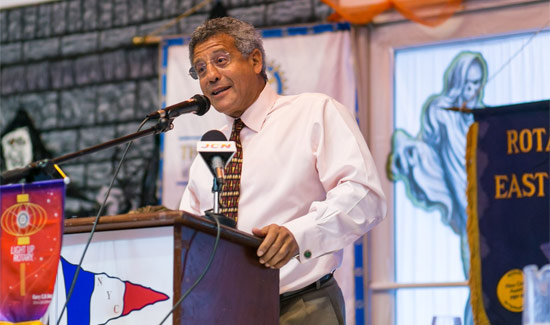
Progressive Liberal Party (PLP) deputy leader Philip Brave Davis yesterday labeled the bundle of anti-crime bills that the government introduced to Parliament as “disappointing” and said they will do little to reverse the crime wave in the country.
“Let me be clear; this government’s crime bills reflect and give effect to this FNM ‘who cares attitude’ and does virtually nothing to address the revenge killing directly,” said Davis as he contributed to debate on the bills in the House of Assembly.
“We vehemently disagree with the idea that this kind of violence is inevitable in The Bahamas. We must use every available resource to give young people a chance.
“That’s why the Progressive Liberal Party believes that efforts to fight crime must go hand in hand with the vision to create jobs in the economy.”
The government has introduced the Evidence Amendment Bill, the Penal Code Amendment Bill, the Criminal Procedure Code Amendment Bill, the Court of Appeal Amendment Bill, the Pawnbrokers and Second-hand Dealers Bill, the Customs Management Bill, the Criminal Evidence Witness Anonymity Amendment Bill, Sexual Offences Amendment Bill, and the Dangerous Drugs Amendment Bill.
Some of the bills would impose heavier sentences on persons convicted of serious crimes.
“This government’s crime bills are woefully inadequate. As I said they are D.O.A. — disappointing on arrival,” Davis said.
“It exposes the folly of our system, a system that focuses primarily on maintaining public order and punishment and that uses crime only as an offense on the government and not an injury to victim or community.
“Victims are not repaid, offenders are not called on to make things right, communities do not take responsibility to see that justice is done. It cries out for the need of a whole new philosophy, a radical new approach to crime, victim and community and project based Bahamas. The PLP plan does just that.”
Davis added some of the amendments to the Criminal Procedure Code are too mundane.
As an example, he pointed to the amendment that would allow the prosecutor to address the court after the defense lawyer in a criminal case.
Currently, the prosecutor gives his or her final submissions followed by the defense lawyer.
As it relates to amendments to the Bail Act, Davis said the government is focusing on the wrong things.
Among the proposed amendments, the bill defines a reasonable amount of time to hold someone without a trial as three years.
“The only answer to this vexing question is to be able to try persons within a reasonable time,” Davis said.
“That’s why I had to say earlier that there is nothing in these bills to show how we can chop the time between arrest and trial. If that happens, this issue of bail would not arise and that’s the long and short of it.
“The attempt to define reasonable time is an admission of our failure to fix the system. Instead of attempting to define reasonable time, we should be promoting initiatives to fix the system, initiatives like swift justice or bring something else that you think might work.”
NO GUARANTEE ON HANGING
Turning to the proposed amendments to the Criminal Procedure Code that set out circumstances under which the death penalty would be mandatory, Davis said those still don’t guarantee that a person will be hanged.
The death penalty would be mandatory for anyone convicted of killing a member of the following organizations: The Royal Bahamas Police Force, the Royal Bahamas Defence Force, the Department of Customs, the Department of Immigration, the judiciary and the prison services system.
The death penalty would also be mandatory if a person is convicted of murdering someone in the commission of a robbery, rape, kidnapping or act of terrorism.
“Amendments [relating to the] issue of capital punishment, they do nothing more than list the circumstances that would attract the death penalty,” Davis said.
“They don’t set guidelines as to when to hang a person. All it says is if these circumstances are seen during a conviction for murder then it will attract the death penalty or [a life sentence].
“That doesn’t mean that it is inevitable that the sentence of death would be handed down. That isn’t a matter for us. We can’t take the blame for that. And so I just want us to be clear about it. We don’t want to send any false hope that what we are doing here will result in capital punishment.”
Even with murders being categorized, murder convicts still have the right to appeal to the Privy Council.
The death penalty has not been carried out in The Bahamas since David Mitchell was executed in 2000.
By: Krystel Rolle
Guardian Staff Reporter
krystel@nasgaurd.com


